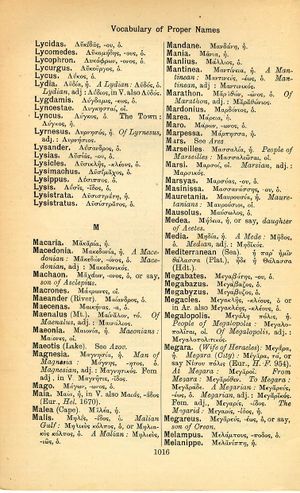Lysimachus
Ὦ τύμβος, ὦ νυμφεῖον, ὦ κατασκαφὴς οἴκησις αἰείφρουρος, οἷ πορεύομαι πρὸς τοὺς ἐμαυτῆς, ὧν ἀριθμὸν ἐν νεκροῖς πλεῖστον δέδεκται Φερσέφασσ' ὀλωλότων. → Tomb, bridal chamber, eternal prison in the caverned rock, whither I go to find mine own, those many who have perished, and whom Persephone hath received among the dead. | Tomb, bridal-chamber, deep-dug eternal prison where I go to find my own, whom in the greatest numbers destruction has seized and Persephone has welcomed among the dead.
English > Greek (Woodhouse)
Λυσίμαχος, ὁ.
Latin > English (Lewis & Short)
Lȳsĭmăchus: i, m., = Λυσίμαχος,
I one of the generals of Alexander the Great, afterwards king of Thrace, and founder of Lysimachia, Cic. Tusc. 1, 43, 102; 5, 40, 117; Plin. 8, 16, 61, § 143; Just. 17, 1.—
II An Acarnanian, instructor of Alexander the Great, Just. 15, 3.—
III The discoverer of the herb lysimachia, Plin. 25, 7, 35, § 72.—
The name of a man, Plaut. Merc. 2, 2, 41.
Latin > French (Gaffiot 2016)
(2) Lȳsĭmăchus, ī, m. (Λυσίμαχος), Lysimaque [un des plus fameux généraux d’Alexandre] : Cic. Tusc. 1, 102 ; Plin. 8, 143 ; Just. 17, 1, 2 || nom d’un Acarnanien, maître d’Alexandre : Just. 15, 3, 1 || autres du même nom : Pl. Merc. 272 ; Plin. 25, 72.
Latin > German (Georges)
Lȳsimachus, ī, m. (Λυσίμαχος), einer der Feldherrn Alexanders des Gr., nach dessen Tode Beherrscher von Thrazien u. Pontus, Cic. Tusc. 1, 102. Iustin. 17, 1 sqq.

